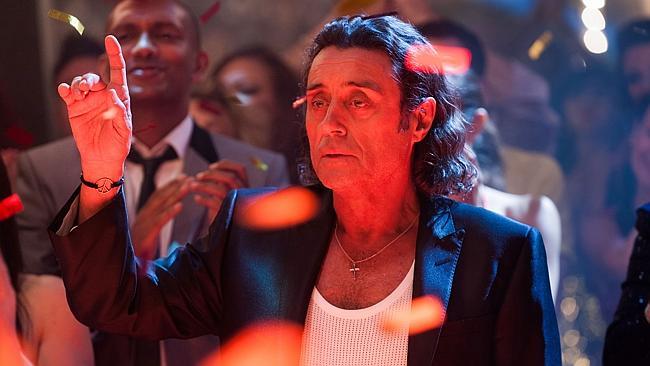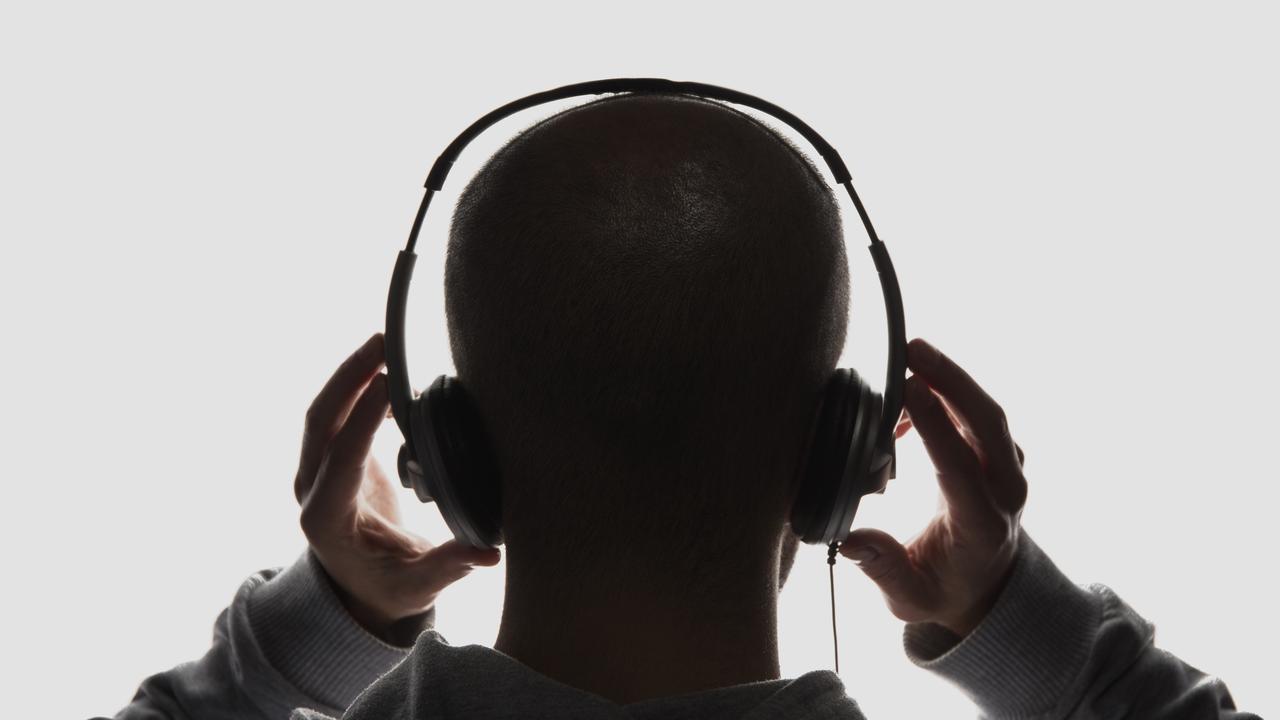Ian McShane is Hollywood’s bad guy, from Deadwood to Cuban Fury
HE has lived hard and played tough, but British actor Ian McShane is still at the top of his game.

IAN McShane meets me at his neighbourhood restaurant, Scotts, in London’s Mayfair, where 007 creator Ian Fleming first dreamed up the legend of James Bond over one of its famous dry martinis. Since the secret agent’s looks in the original books were very much in the black-haired, blue-eyed McShane mould, I’m curious about whether he had ever had Bond ambitions himself.
“No, I could never have played Bond after Sean Connery — he was the definitive one,” says McShane, recalling how “Sean was the actor that my mum most enjoyed meeting (at the premiere of their 1974 film The Terrorists) — but then I find most women like Sean …”
Instead, McShane has carved out his own hugely successful 52-year career in television as well as in film and theatre on both sides of the Atlantic. He’s best-known in the title role of the long-running BBC1 hit Lovejoy, as the brutal yet charismatic brothel-keeper Al Swearengen in the HBO western Deadwood (which won him a Golden Globe and got him crowned TV’s Sexiest Villain by People magazine in 2005) and as a deliciously evil, insanely hirsute Blackbeard in Pirates of the Caribbean: On Stranger Tides. Now whenever Tinseltown wants a villain that can eat up the screen, it seems McShane is the go-to gangster of choice — even though he has to keep warning his elderly mother off his most violent, expletive-undeleted films.
“Excuse me!” barks McShane with mock-outrage. “Hollywood doesn’t call them baddies any more: we call them Complicated People With Issues — even if they’ve killed 17 people.” Yet such is his mastery of menace that even his latest film, the rom-com Cuban Fury, playfully trades on McShane’s ability to intimidate by giving him the big build-up as the disciplinarian dance teacher from hell.
In real life, the approachable, sociable McShane is nothing like the tough guys he plays, although he jokes that “it depends how you catch me, darlin’ — I’m quick to flare up, but it’s over pretty quick”. And despite having worked with every big name — from Judi Dench, Laurence Olivier and his hellraising film-noir hero Robert Mitchum to Johnny Depp — McShane’s not remotely grand. “Don’t take yourself too seriously,” is his advice for young actors. “These days kids want to be stars within two years, but in our business, you’ve got to have luck. I’m lucky I’m still going, but then actors never retire — they just lose the script.’’
He feels particularly lucky at having survived and thrived in the notoriously fickle world of show business despite a hellraising past of his own that matched Mitchum’s. Along with the rest of the acting community and billions of film fans worldwide, McShane has been shocked by the recent death of Oscar-winning actor Philip Seymour Hoffman, 46. “I didn’t know him, but my old friend John Hurt had worked with him and was reminiscing about him to me a few days ago; it’s so sad,” says McShane, who adds that he and his wife, Gwen, are mourning the death of another close friend — a woman whom he prefers not to name — from alcoholism. “She was a dear, dear friend who didn’t have a mean bone in her body; it’s such a tragedy that she could not get sober. Her addiction had baffled us for years; it’s such a mysterious illness, addiction,” he says, thankful that he managed to conquer his own demons of drink and drugs.
McShane’s party-animal years of boozing and cocaine abuse between the ages of 18 to 45 have been well documented. An early drinking buddy was playwright Joe Orton, in whose jet-black comedy Loot McShane starred back in 1965. But it was Richard Burton, who was 17 years older than McShane and by then a chronic alcoholic, who introduced the younger man to the “salty dog” breakfast, a combination of kippers, vodka and grapefruit juice, topped up by more vodka in the pub at lunchtime, when McShane played his lover in the Kray Brothers-inspired 1971 film Villain. Some of it might have been downed for Dutch courage; McShane and Burton had to pucker up for a gay kiss in one scene. As the hedonistic 70s unfolded, cocaine became the glamorous drug of choice and the English McShane, who had moved his family over to LA in 1975 to try his luck in Hollywood, couldn’t wait to join the in-crowd. Yet now he reveals that he also took heroin.
“I had a snort of heroin in LA years ago — I would snort anything once,” McShane says candidly. “I’m not going to be a hypocrite and pretend I was a good example to young people; I enjoyed everything that was going at one time. Then one afternoon I had an epiphany and thought, ‘This is enough’ — and gave up all the drugs.”
McShane has had some high-profile relationships over the years, but says he had “never really been in love before till I met the actress Gwen Humble”. And she proved a great influence: seven years after their wedding, he decided to give up booze too by going to Alcoholics Anonymous. As he said at the time, “That lifestyle is exhausting. I thought, ‘You’re getting old.’ I didn’t say to Gwen, ‘I’m doing this for you, darling,’ because it puts enormous responsibility on the other person; but she was definitely at the back of my mind when I did it. And AA made me seriously grow up.”
The dark side of McShane’s life is confined to the screen these days, with the lighthearted Lovejoy image left far behind by the gangster he played in the 2000 film Sexy Beast with Ben Kingsley and Ray Winstone that led to his being offered the standout role of Swearengen, the ultimate hellraiser’s hellraiser.
The corrupt Bishop Waleran Bigod followed in the 2010 television series Pillars of the Earth, notoriously whipping himself into a frenzy as he plotted to extend his evil empire.
Yet McShane simply insists that People With Complicated Issues are more fun to play; as he puts it, “the devil gets all the best tunes”.
At 71, the blue-jeaned McShane looks years younger, thanks to the kind of Mediterranean-looking skin that ages well and dark hair that refuses to go grey.
“I still love acting, but sometimes you think how spoilt and cosseted you are with all the advantages I get, all the places I’ve seen,” says McShane, who believes in keeping it real by hanging out with artist friends in bohemian East LA rather than with other actors.
A born maverick who made his West End debut back in 1967 alongside Dench and Ian McKellen in the Russian love-and-war play The Promise and has played everyone from Judas Iscariot to Sue-Ellen’s lover in Dallas, McShane says he could never be a “theatre company man, working with all those Oxbridge directors”.
Instead he enjoys the creative freedom of shuttling back and forth between film and TV on both sides of the Atlantic, more in demand than ever. And he’s more than happy to send up his tough screen image as salsa guru Ron Parfitt in Cuban Fury — which has the rare virtue on McShane’s recent CV of being completely safe for his mother to watch.
“I warn her off the ones with lots of violence and swearing,” admits McShane. “When she asks me what they’re about, I say, ‘Not one for you, Mum!’”
His role on Cuban Fury came about after McShane worked with its star, Shaun of the Dead/Hot Fuzz comedy actor and writer Nick Frost, on the film Snow White And The Huntsman when they played two of the seven dwarfs.
It seems there was a lot of time for two Brits with a shared sense of humour to bond between takes: as McShane puts it, “If I heard Charlize Theron say “Mirror Mirror” one more time …”
Ron is the grizzled old mentor who helps Nick’s character, hapless bullied hero Bruce, to get his mojo back and also get the girl by doing a John Travolta and stamping all over the salsa floor. The dance routines are devised by the choreographer from British television show Strictly Come Dancing.
The cast also includes Chris O’Dowd as Bruce’s rival in love and Olivia Colman as Bruce’s sister and dance partner. “Olivia is such a nice girl — she doesn’t take herself seriously, only the work,” says McShane of the Broadchurch star whom he partners on the dance floor for Cuban Fury’s memorable salsa scenes.
“It was the name Ron Parfitt that decided me to sign up for the film, although don’t tell Status Quo’s Rick Parfitt,” he jokes. “The script was very funny and Nick is a smart guy — I like the clever movies he’s made with Simon Pegg.”
This is an actor who pays such attention to detail that although he once said he would prefer to be whipped than to have his hair shaved at the back into a tonsure (a clerical bald patch) as Bishop Waleran Bigod, he even decided to get his hair straightened to play the role — and then had a fake tonsure fitted over it. As he explains, “You can’t have a curly-haired priest, it doesn’t look right. And I just didn’t want a hole shaved in the middle of my head for Pillars, thank you!”
As for Parfitt, McShane says he “loved his loud shirts — he lives the salsa dream, doesn’t he? He’s the real thing, Ron, he doesn’t give a shit. He’s probably got about three kids in Cuba, three more in Spain and mistresses all over. He’ll never get married, dancing is his life, he comes across as grumpy — but at heart he’s a good guy.”
Last year McShane took another rare good-guy part when he filmed the forthcoming Hercules in Budapest, which reunited him with his old RADA classmate and flatmate Hurt — another reformed hellraiser and McShane’s co-star in their first film, 1962’s The Wild and the Willing. “I play the bearded old mentor to Hercules — Ron Parfitt taken to extremes,” grins McShane, who will also be taking on another epic role in the British actor/writer/director Steven Berkoff’s plan for a modern gangster version of the Greek legend of Agamemnon. “I don’t look English-English and that’s an advantage — that’s why I can play all sorts of different things,” says McShane.
He’s at the stage in his career where he feels free to speak his mind, even though he admits that “if you speak truth to power, they don’t like it”.
“Being an actor is like being a magician, a great dream,” he concludes. “Although my mother still asks why I keep playing baddies — sorry, Complicated People With Issues. She probably wishes I was a doctor in Manchester instead.”
© IFA-Amsterdam
Cuban Fury is open nationally.


